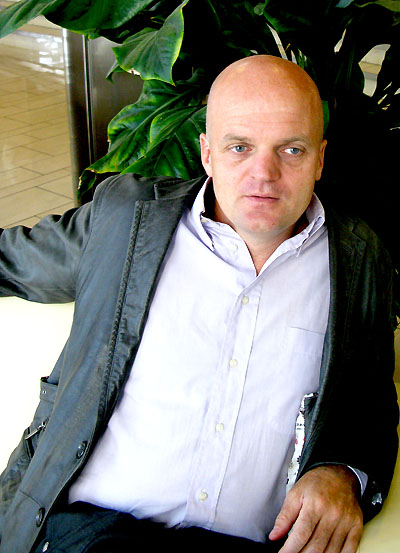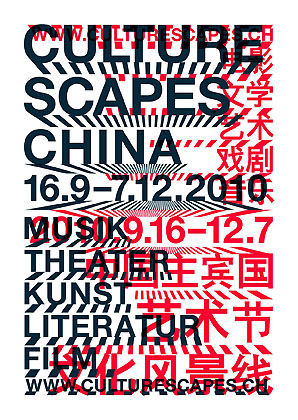Culturescapes: Exploring the cultural
landscape of China today
by Michèle Vicat

Jurriaan Cooiman, photograph Michèle
Vicat© 2010 |
Based
in Basel, Switzerland, Culturescapes explores a different
country’s
culture each year. The focus this year is on China, its art,
film, theater, music, literature and individual performances.
The program runs from Septembre to December 2010. We talked
with Jurriaan Cooiman, Culturescapes’ creator
and director while he was in Geneva for the opening of Butterfly
Lovers, a traditional Yue Opera.
How did you get involved with Culturescapes?
I am the founder! I started it from a festival of contemporary
music in the mid-1990s in Basel. The concept was to look at
contemporary composers in the context that had inspired
them or in which they
had inspired others. An example is Sofia Goubaïdoulina,
a Russian composer. We wanted to see who inspired her and her
work, and which poet or painter, on the other side, was also
inspired by her work. I was looking at an artistic milieu,
and I was looking at it through the eyes of contemporary music.
From
that perspective, I saw a cultural-scape, like a cultural landscape,
which included not only contemporary music from different countries,
but also all the other fields. What they have in common is
a common language, a common history and common traumas. From
these
three elements, artists digest the message that they want to
explore. As soon as they do that, it is no longer a national
theme. It becomes universal.
The framework is culture-scape. China is our theme this year.
The framework and the country become a translation of the issues
of Chinese society, but following the method of an artist. The
method of an artist is never nationalistic.
I
founded Culturescapes in
2003. We started with Georgia and then we did the Ukraine, Armenia,
Estonia, Romania, Turkey, and
Azerbaijan. Now, we are at number 8, China, and next year
it will be Israel.
 |
| MAD-Chongqing
Urban Forest. Courtesy Culturescapes |
How do you choose a country?
I
do research and I also have my own preferences based on my
own subjective feelings.
I started
with Eastern Europe. The Iron Curtain was there for
half a century and we were not aware of the specific cultures
on the
other side.
Then the wall fell, the curtain was open, but we continued
to look at the whole region as being the East. I thought
we must
have more specific information about what Estonia is,
for example, and we needed to find out how it was different
from Lithuania
or Romania. There are huge differences between these
countries
and not only with the language. I wanted to know each
country’s
relationship with its neighbors. At the beginning,
the choice was made according to this consideration.
Then,
of course,
I recognized that the process would repeat itself and
finally it
would not be interesting. I started to go beyond it
with Turkey.
Why China?
China is the biggest step for our festival. It is the
farthest from our civilization, which is based on
Greek philosophy, Christian-based
judicial principles, Judaism and monotheism. These
four elements are very important in understanding our western
cultures. China
was closed for a long period of time.
I started to do research on China but there were
a lot of considerations.
What do you think that Swiss people will take
from your program? What do you want that they “learn” or
discover about China?
I can only offer possibilities. I hope people
can open up and start to realize that there
are many
Chinas,
and that
we should
be interested in China because it will be
a major player in the next century. The Chinese
know
a lot about us
and we know
very
little about them. Culturescapes offers the
possibility to learn more. It makes many
connections through
cultural institutions.
We have 40 to 50 different institutions collaborating
in the framework of Culturescapes.
For example, Festival Images
in
Vevey,
the Théâtre du Grütli in
Geneva, the Kunst Museum in Bern, the Stadt
Casino in
Basel. They all
offer
their own infrastructures. Culturescapes operates on the Swiss side.
It is expanding the cultural scene beyond
a niche, beyond a limited point of view and
we are showing
that we can
do this
together.
On the one side, it is something that is
Swiss whether China is involved or not. We
are massaging
the Swiss
cultural scene.
We are showing that we can work together
because culture is very important. I want
to raise that
awareness,
but for that
you need
to have a certain critical mass. If we are
doing it together, we have weight. If everybody
works
alone,
we are all small
and we have no power.
 |
Was it hard to convince people, to get partnerships?
No. Of course, we are now at the eighth edition.
We gained momentum with recognition from
the central government
in Bern, the cantons,
with greetings and patronage from the president
of Switzerland, Doris Leuthard, and even
from Hu Jintao,
the President
of China. So, we are recognized, we have
partners willing to collaborate
because they usually cannot afford to bring
groups from China. I did a direct deal
with the Chinese
Ministry
of Culture. It
is a huge organization and I managed to
have a contract with them, which allows me to bring
more than 400
artists to Switzerland.
I have something to offer, the partners
have something to offer and together we are bringing
a higher awareness
of culture. It
is a win-win situation. Even three times
that. Because these groups are coming from abroad,
in this instance
from China, they
are invited for a tour in different cities.
It is interesting for the artists, for
the Swiss partners,
for the Chinese
Ministry of Culture, and for the Swiss
in general. It is an anti-festival
model. With a festival, you have a central
venue, at a specific moment of the year.
We operate for
three months
and we are decentralized.
Do you think that there will be a counterpart
of your program in China?
ProHelvetia has been running a counterpart
for two years. They brought many events
to Switzerland, but
they also
send Swiss
artists abroad. But, next year, I would
like to have a strong presence of Swiss
artists
with our next
program in Israel.
.jpg) |
RMB
City Opera, Cao Fei. Courtesy Culturescapes |
What were your impressions about China
before you started this program?
Are they evolving?
For me, China was the unknown,
it was very unclear. You read
stories in the
newspapers
about China’s economic
power, about human rights,
about minorities, about Tibet,
about Tian’anmen
Square, Taiwan. Things are
there somewhere in the air
but now,
being in contact
with China
for two
years,
I can approach
some
questions through personal
contact. The answers or parts
of the answers
are more
concrete.
From what I
learned on
a personal
level, it would be very interesting
if more people could have this
kind of relationship.
It convinced
me that it
would be
fruitful
if we could reduce the fear.
To talk with
Wang Jianwei about the perceptions
of reality for
example (see Pointer at Work--Welcome
to the Desert of the Real).
Is there any program in the festival
that you prefer or feel close
to?
I do not differentiate between
art forms. We could have done
a Culturescapes about
film,
or about literature,
or theater.
We did not do this. We have
four major themes from which
you can learn about China or
any
country.
One is called “Searching for the Roots” (Wurzeln
Suchen), which looks at how China connects with its traditions,
how the Chinese outside of China deal with their traditions.
A second theme is “New Voices” (Neu Stimmen) which
looks at the explosion of young talent exploring new creative
paths in China right now. These are the two main themes. Then,
we have sub-themes on these two themes. We look inside each theme.
If you are “Searching for the Roots,” you are looking
at “Inside Views” (Innen-Ansichten) of a society
working on itself. You are no longer only looking at traditions
but at how the young culture of China is being assimilated. If
you see “New Voices” in development, they go “Beyond
the Wall” (Über Die Mauer) of China. Getting “Beyond
the Wall” refers to projects in the festival in all art
forms that relate to western influences or Swiss artists. So, “Searching
for the Roots” looks inside, and finding “New Voices” pays
attention to what is “Beyond the Wall”. I prefer
the inside. “New Voices” has
no meaning if it is not
about something. Tradition
is also
meaningless if
it is
not about something: what
the Chinese are doing now,
how
they understand
population growth, the
growth of economic power,
pollution,
contact
with the West,
and how the
Chinese digest their
last 30 years
of history, what happened
with the Cultural Revolution,
with
the numerous
famines?
.jpg) |
Butterfly
Lovers, Opera.
Courtesy Culturescapes
|
Do
the artists who come here also meet the local population?
Do they
participate
in local
events?
It depends. Some artists
stay here for two or
three months.
There
is a competition
for
young
composers
and they are
in contact
with Swiss institutions
and with local groups.
But, mostly,
artists
are invited
to bring
their show.
Normally, we
have a talk after
the show. If artists
stay longer, they are
asked
to express what
they think
in addition
to showing
their
work. But
mainly, we
focus on the work,
otherwise we have to organize lectures.
Maybe
we should
think
about that…
Did you encounter difficulties
with the program?
Was China a more challenging
project
than others?
It was more complicated
because of the
distance. On the other
hand, it was easier
because
culture is the
domain
of the
Chinese Ministry
of Culture. The
program was mine;
they did not
interfere
with the program.
But
it took a long
time to get
their agreement
on the
program and
I was
very slow
at telling
them what I
really wanted to
do. From the beginning,
I put everything
on
the table and we
started to know
each other. Gradually,
you
bring the questions,
the possibilities
on the discussion
table. You
bring the major
points, the most
important events
and
finally the program
starts to find
a way. You can only
do this
if there
is trust
on both
sides. This finally
worked
very well. My main
contact was the
Chinese Attaché Culturel
at the embassy
here in Bern. He
speaks
German. He understands
the
European
mentality
and
also that things
change and
develop along the
road. He listened
carefully
and we understood
each other.
So,
the
difficulties were
not at the level
of making
things
impossible,
but at the
level
of intensity
of putting the
program together.
I had to
be on top of it.
I went to China
seven times
in
twenty
months.
I met
the person
in charge at the
Chinese Ministry
of Culture
twenty times. There
were several cities
involved
including
Beijing and Shanghai.
So there were different
city,
political and
cultural frameworks.
These are huge
infrastructures
and when they come
to Switzerland,
everything is so
small!
But the
Chinese
took everything
very seriously.
So, we did
not
face any
real problems.
How did you locate
these cultural
events and groups?
I worked with
Swiss cultural
institutions
that are
already working
with China.
They gave me
advice.
You start with
a small network
and then it gets
bigger and bigger.
Then, you
have to sort
it out.
It is a process
of elimination
and
integration.
Clearly,
it is a very
subjective program.
There are
some things that
you learn about
too late to
include. You
include things
when it is
possible. I benefited
from the input
of some experts
in China.
We did a
research
trip with
a bigger group
of Swiss curators
and theater directors
to find what
was
on the Chinese
side.
We spent
10 days between
Beijing
and Shanghai
and ended up
with a huge program
and
I started to
work with
my colleagues
of Culturescapes to sort
out what
could be done.
.jpg) |
Marionnette
Theater from Quanzhou.
Courtesy Culturescapes |
What do you hope
to get from
this program on
China? What
do you expect
that Swiss
people
would get
from it?
If
this program could do
the same
for a
Swiss audience
that
it did
for me
while
I was preparing
it, I would
be very
happy. Reducing
the fear
of this
huge country
that is
China. That would
be the
main part. I feel
that
there are
so many
fears about China.
For
the cultural
institutions,
the festival
should
make
them realize
that
they should
work
and stick
together
in order
to have
power
in Switzerland’s federal system. If they are
small,
they are weak. There are different parts of the agenda
that
I hope can be developed. On the Chinese side, it concerns
fear.
The next step will be to compare what they do with what
we do.
This day is not the only day: there are many days. We
are not only “we” but also many “I.”
One of
the
major goals
of
Culturescapes is
to
learn from
the
differences…
Yes.
This
is
the
aesthetic
field
where,
for
example,
Wang
Jianwei
says, “this
is
my
method.
I
can
only
show
parallel
worlds
in
this
way.” We
should
start
to
see
this
difference,
get
really
into
it,
and
then
get
something
from
it.
The
cultural
field
is
often
very
easily
presented
like
fast
food.
People
can
have
a
clue
very
quickly.
But,
for
me,
this
is
not
going
very
far.
With
certain
artists
in
the
program
you
need
a
longer
time.
And
with
some
others
it
goes
very
quickly
of
course.
It
is
nice
to
have
jazz
singers
like
Coco
Zhao
and
Wu
Na,
spending
three
weeks
all
over
Switzerland.
With
someone
like
Wang
Jianwei,
you
need
time
and
you
only
get
a
certain
amount
of
what
they
bring.
.jpg) |
Pet
Conspirency, Music.
Courtesy Culturescapes |
Most
of the
time, people
look for
a traditional
or more
conventional presentation
of China.
That was
one of
the comments
of Wang
Jianwei after
the presentation
of his
play “Welcome to the Desert
of the Real” at the Théâtre du Grütli
here in Geneva. Wang Jianwei said that the audience
in the West tries to find a story that is “Chinese” in
its form
and in
its context.
People
are very
skeptical about
the idea
of introducing
contemporary Chinese
culture while
there are
questions about
minorities, Tibet,
human rights.
That was
one of
the major
criticisms made
by Belgian
journalists at
Europalia/China. Do
people react
the same
way here?
May
be less
so because
we are
a grass roots
organization. Europalia is a
top-down organization.
It is
based on
the desire
of two
governments to
work together
on cultural
issues. They
are not
good at
that because
this is
not their
job. I collaborate
with the
Ministry of
Culture but
I do
the job.
I only ask
their support.
Even if
the Swiss
government made
greetings and
gave money,
they do
not do
the job.
They do
not want
to do
that job.
You have
to be
very clear
in separating
tasks and
responsibilities. Europalia was
over
ambitious, much
too big.
It was
serving too
many purposes.
I
am not
involved with
the question
about Tibet.
I did not
incorporate it
in my
program. If
I did, I
would have
done a Culturescapes program on
Tibet. The
moment you
try to
incorporate all
these themes
together, people
would have
the feeling
that it
is one
or the
other and
I am not
so sure
about this.
Now,
you are
putting together
your next
program on
Israel. How
do you
see it?
It
will be
on how
Israel is
looking at
its problems
from the
inside. I am
not incorporating
Palestinian artists
because it
would give
the impression
that they
are doing
collaborative work.
For this
reason, we
stick with
the Israeli
side, showing
their problems.
I know that
it is
a reduced picture
of the
area but
it is
a way to
show how
Israel is
coping with
the fragmented
sections of
its society.
How they
face their
identity, their
position toward
minorities, meaning
majorities, as
neighbors. I am
very inspired
to go
there. I have
already been
twice and
you can
very quickly
grasp substantial
elements.
Yes,
it is
heavy…
As
well as
it was
for China
and will
be with
our 2012
program on
the United
States!
It
is healthy
to follow
your own
agenda and
not to
compromise with
governments?
That’s
correct. In
exchanges with
the Chinese
Ministry of
Culture, it
is very
interesting to
deal with
them as
an independent
organization because
they have
their own
ideas about
what culture
is. I
have something
else in
my mind.
Who has
the truth?
It does
not matter
because you
work on
it. Why
should I
tell them
that they
are wrong?
It is
a process
of understanding.
We have
two legs.
We have
to balance
them and
we cannot
say it
is one
or the
other.
For
more information and the program schedule, see the website
at http://www.culturescapes.ch